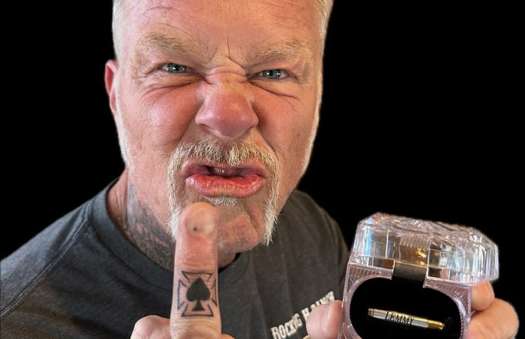For some reason, writing a review of a film that documents the life and times of the world's most famous film critic, Roger Ebert, feels like particularly cruel and unusual punishment for a would-be writer. How do you write about the person who helped transform a simple hand movement into box office gold?
Taking its title from the best selling memoir of the same name, Life Itself profiles, from start to finish, the life of 46-year Chicago Sun-Times film critic Roger Ebert.
Born in 1942 in Urbana, Illinois, Ebert showed a gift for gab and the written word early on. Working as a full-time reporter at his local newspaper by the age of 15, Ebert would go on to become the editor-in-chief of the University of Illinois' daily newspaper, the Daily Illini. After being offered a PhD placement upon graduation at the University of Chicago, he was hired as a part-time writer at the Chicago Sun-Times and promoted as the newspaper's film critic in 1967, a position he held until his death in 2013.
You probably know the rest: Ebert meets a young film critic named Gene Siskel from the neighbouring Chicago Tribune, their egos and arrogant virtues appear to be the perfect match for public television, and film criticism slowly steps away from the intelligentsia and into the homes of families across the nation, allowing millions of viewers access to a myriad of arguments and understandings about cinema. Ebert's no-nonsense, Midwestern approach to writing had been experienced before in the world of film criticism, but never had someone explained it so eloquently for the American everyman.
With a voracious appetite for words, food, alcohol and women, Ebert was certainly a powerful figure on the world's stage. But what stands out in Steve James' newest documentary is his honest and striking depiction of the film critic's decline.
With filming taking place in 2012 during the last months of his life, we are forced to watch the brutal and harsh reality of a man knocking on death's door. After multiple surgeries, Ebert's lower jawbone is now gone, removed bit by bit many years ago after cancer began its descent into the core of his body. Holed up in the hospital with a hairline fracture on his hip (one that would signify the return of cancerous cells in his body), Ebert appears to be in a chipper mood, cracking jokes about his current state of physical deformity and medical shortcomings. In one particularly agonizing sequence, we find Ebert force-fed liquid nutrients through a tube into his oesophagus; following the procedure, he praises James for perfectly capturing the art of "suction" on camera.
It's this depiction of strength and resilience in the face of fatality that lies at the heart of Life Itself, a film about the life of the world's foremost film critic that ultimately ends up being so much more.
Early on in the film, Ebert is captured at a conference discussing the power of cinema. "For me, the movies are like a machine that generates empathy," he says. "It helps us to identify with the people who are sharing this journey with us." In that regard, Life Itself is a tremendous success, but if anything, it reminds us to cherish our time and watch more movies together.
(Magnolia)Taking its title from the best selling memoir of the same name, Life Itself profiles, from start to finish, the life of 46-year Chicago Sun-Times film critic Roger Ebert.
Born in 1942 in Urbana, Illinois, Ebert showed a gift for gab and the written word early on. Working as a full-time reporter at his local newspaper by the age of 15, Ebert would go on to become the editor-in-chief of the University of Illinois' daily newspaper, the Daily Illini. After being offered a PhD placement upon graduation at the University of Chicago, he was hired as a part-time writer at the Chicago Sun-Times and promoted as the newspaper's film critic in 1967, a position he held until his death in 2013.
You probably know the rest: Ebert meets a young film critic named Gene Siskel from the neighbouring Chicago Tribune, their egos and arrogant virtues appear to be the perfect match for public television, and film criticism slowly steps away from the intelligentsia and into the homes of families across the nation, allowing millions of viewers access to a myriad of arguments and understandings about cinema. Ebert's no-nonsense, Midwestern approach to writing had been experienced before in the world of film criticism, but never had someone explained it so eloquently for the American everyman.
With a voracious appetite for words, food, alcohol and women, Ebert was certainly a powerful figure on the world's stage. But what stands out in Steve James' newest documentary is his honest and striking depiction of the film critic's decline.
With filming taking place in 2012 during the last months of his life, we are forced to watch the brutal and harsh reality of a man knocking on death's door. After multiple surgeries, Ebert's lower jawbone is now gone, removed bit by bit many years ago after cancer began its descent into the core of his body. Holed up in the hospital with a hairline fracture on his hip (one that would signify the return of cancerous cells in his body), Ebert appears to be in a chipper mood, cracking jokes about his current state of physical deformity and medical shortcomings. In one particularly agonizing sequence, we find Ebert force-fed liquid nutrients through a tube into his oesophagus; following the procedure, he praises James for perfectly capturing the art of "suction" on camera.
It's this depiction of strength and resilience in the face of fatality that lies at the heart of Life Itself, a film about the life of the world's foremost film critic that ultimately ends up being so much more.
Early on in the film, Ebert is captured at a conference discussing the power of cinema. "For me, the movies are like a machine that generates empathy," he says. "It helps us to identify with the people who are sharing this journey with us." In that regard, Life Itself is a tremendous success, but if anything, it reminds us to cherish our time and watch more movies together.




